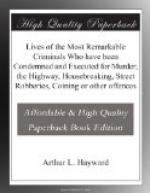Under sentence he behaved with very great sorrow for his offence; he wept whenever any exhortations were made to him, confessed himself one of the greatest of sinners, and with many heavy expressions of grief, seemed to doubt whether even from the mercy of God he could expect forgiveness. Those whose duty it was to instruct him how to prepare himself for death, did all they could to convince him that the greatest danger of not being forgiven arose from such doubtings, and persuaded him to allay the fears of death by a settled faith and hope in Jesus Christ. When he had a while reflected on the promises made in Scripture on the nature of repentance itself, and the relation there is between creatures and their Creator, he became at last better satisfied, and bore the approach of death with tolerable cheerfulness.
When the day of execution came, he received the Sacrament, as is usual for persons in his condition. He declared, then, that he heartily forgave him who had injured him, and particularly the person who, by giving him hopes of life, had endangered his eternal safety. He submitted cheerfully to the decrees of Providence and the Law of the land; being at the time he suffered about thirty-seven years of age.
Richard Scurrier was the son of a blacksmith of the same name, at Kingston-upon-Thames. He followed for a time his father’s business, but growing totally weary of working honestly for his bread, he left his relations, and without any just motive or expectation came up to London. He here betook himself to driving a hackney-coach, which, as he himself acknowledged, was the first inlet into all his misfortunes, for thereby he got into loose and extravagant company, living in a continued series of vice, unenlightened by the grace of God, or any intervals of a virtuous practice.
Such a road of wickedness soon induced him to take illegal methods for money to support it. The papers which I have in my hands concerning him, do not say whether the fact he committed was done at the persuasion of others, or merely out of his own wicked inclinations; nay, I cannot be so much as positive whether he had any associates or no; but in the beginning of his thievish practices, he committed petit larceny, which was immediately discovered. He thereupon was apprehended and committed to Newgate. At the next sessions he was tried, and the fact being plain, he was convicted; but being very young, the Court, through its usual tenderness, determined to soften his punishment into a private whipping. But before that was done, he joined with some other desperate fellows, forced the outward door of the prison as the keeper was going in and escaped.




